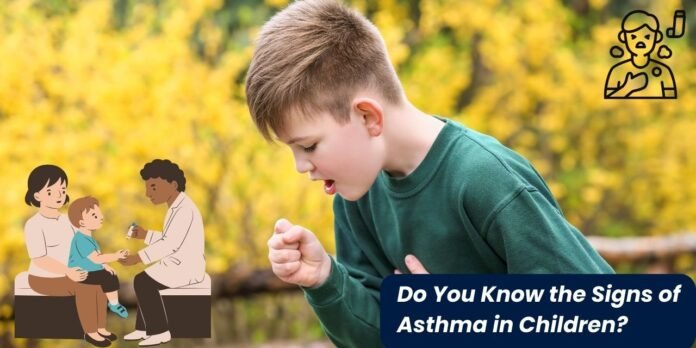Asthma is one of the most common chronic respiratory diseases affecting children. It is characterised by inflammation and narrowing of the airways, leading to difficulty in breathing, coughing, wheezing, and chest tightness. Understanding asthma in children is crucial for parents and caregivers, as early diagnosis and effective management can significantly improve a child’s quality of life.
What is Asthma?
Asthma is a long-term condition that can start in childhood. According to the World Health Organization (WHO), it affects approximately 14% of children worldwide. Symptoms can vary from mild to severe, and they may worsen during physical activity or in response to specific triggers such as allergens, respiratory infections, cold air, and smoke.
Common Symptoms of Asthma in Children
Recognizing the symptoms of asthma is vital for early diagnosis and management. Common symptoms include:
- Wheezing: A high-pitched whistling sound during breathing, especially when exhaling.
- Coughing: Frequent cough, particularly at night or early in the morning.
- Shortness of Breath: Difficulty breathing or feeling out of breath during physical activity.
- Chest Tightness: A feeling of constriction or pressure in the chest.
If your child experiences these symptoms, it is essential to consult a healthcare professional promptly.
Early Diagnosis of Asthma
Early diagnosis of asthma is crucial to managing the condition effectively. The process typically involves:
- Medical History: A thorough medical history will help identify any family history of asthma or allergies.
- Physical Examination: A physical examination can help the healthcare provider assess your child’s respiratory health.
- Lung Function Tests: Tests such as spirometry can measure how well your child’s lungs are functioning. These tests help determine if there is any obstruction in the airways.
When to Seek Help
It is essential to consult a child specialist in Banga if your child shows persistent symptoms of asthma. Early intervention can prevent complications and improve long-term outcomes.
Effective Management Strategies
Managing asthma in children involves a combination of medication and lifestyle adjustments. Here are some effective management strategies:
1. Medication
Medications are crucial for controlling asthma symptoms. They are generally divided into two categories:
- Long-term Control Medications: These medications, such as inhaled corticosteroids, help reduce inflammation in the airways. They are taken daily to maintain control over asthma symptoms.
- Quick-Relief Medications: Also known as rescue inhalers, these medications are used during an asthma attack to provide immediate relief. They work by relaxing the muscles around the airways, making it easier to breathe.
2. Allergy Management
Identifying and avoiding triggers can significantly reduce asthma symptoms. Common triggers include dust mites, pet dander, mould, pollen, and smoke. Here are some tips to manage allergies effectively:
- Keep the Home Clean: Regularly dust and vacuum your home to reduce allergens.
- Use Air Filters: HEPA filters can help trap airborne allergens.
- Limit Exposure to Smoke: Avoid smoking indoors and reduce exposure to secondhand smoke.
3. Lifestyle Modifications
Encouraging a healthy lifestyle can also help manage asthma. Here are some suggestions:
- Regular Exercise: Physical activity is important for overall health but should be approached cautiously in children with asthma. Consult a doctor for a suitable exercise plan.
- Healthy Diet: A balanced diet rich in fruits and vegetables can support lung health.
- Maintain a Healthy Weight: Obesity can worsen asthma symptoms, so maintaining a healthy weight is essential.
4. Asthma Action Plan
Working with your child’s healthcare provider to develop an asthma action plan is crucial. This plan outlines what to do in case of an asthma attack and includes:
- Daily management strategies
- Signs of worsening asthma
- When to seek emergency help
Conclusion
Asthma in children is a manageable condition, especially with early diagnosis and effective treatment. Parents and caregivers should be vigilant about recognizing symptoms and seeking help from a qualified child specialist in Banga. With the right medications, lifestyle changes, and a comprehensive asthma action plan, children with asthma can lead active, healthy lives.
If you have concerns about your child’s asthma or need expert guidance, consult Dr. Jasmeen Cheema at Cheema Hospital & Maternity Home. With her extensive experience in paediatric care, she can provide the support and management strategies your child needs to thrive. To get more information please contact us on : +919855533574



